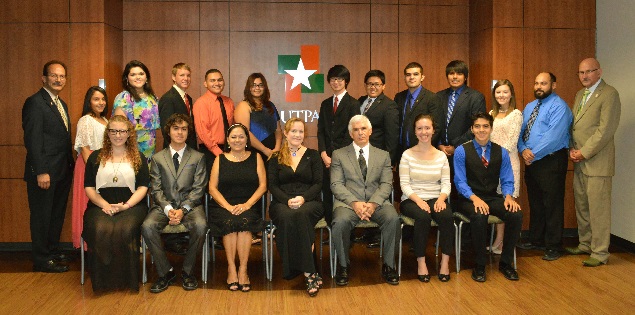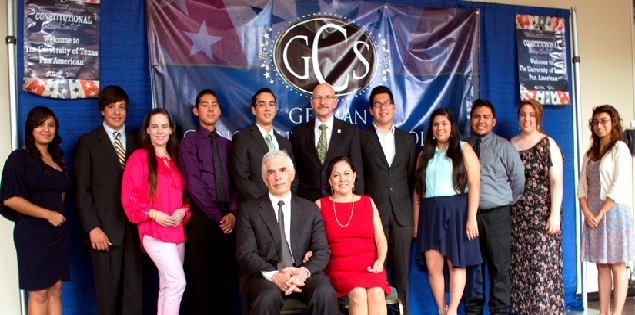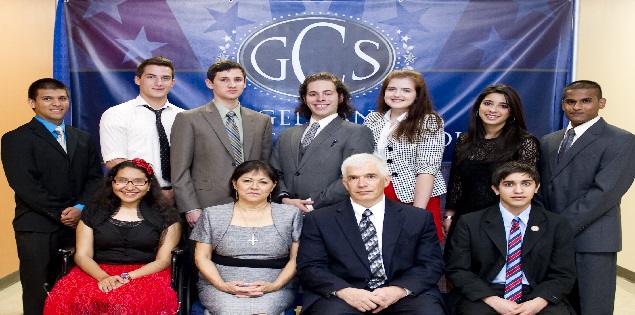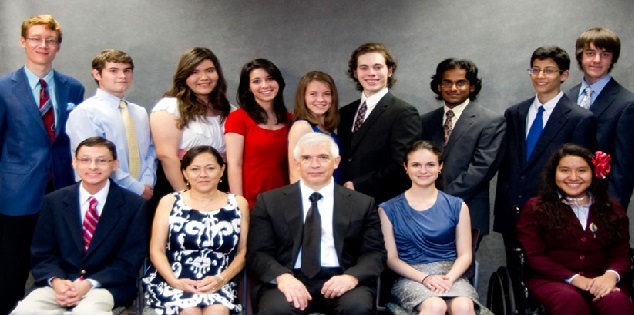Previous Years
These are the Gelman Constitutional Scholars throughout the existence of the program.

The 2014 Constitutional Essay Contest Finalists along with donors Dr. Lawrence Gelman and Mrs. Esperanza Gelman. From Left, Back: University Provost Dr. Havidan Rodriguez, Reba Rivera, Jessica Barrera, Cody Hughes, Lee Roldan, Sandra Selena April Fish, Chi Hsiu (Jeffery) Hung, Marc Roque, William Fuerte, Omar Martinez, Casey Hughes, Carl Zayas, University President Dr. Robert S. Nelson; Front: Mimosa Thomas, Jose Garcia, Mrs. Esperanza Gelman, Dr. Cynthia Jones, Dr. Lawrence Gelman, Margarita Mendez, Jorge Vidal.

The 2014 Senior Constitutional Scholars along with donors Dr. Lawrence Gelman and Mrs. Esperanza Gelman. From Left, Back: Edgar Navejar, Juan Carlos Lago, Dr. Cynthia Jones, Cameron Moreno, Reagan Ashley; Front: Mrs. Esperanza Gelman, Dr. Lawrence Gelman. Not pictured: Josiah Borden, Evan Schauer.

The 2013 Constitutional Essay Contest Finalists along with donors Dr. Lawrence Gelman and Mrs. Esperanza Gelman. From Left, Back: Gabriela Avila, Douglas DeLeon, Jennifer Salazar, M. Eduardo Martinez, Juan Carlos Lago, University President Robert S. Nelson, Omar Olivarez,Abigail Zepeda, Cameron Moreno, Jessica McKinney, Monica Garcia; Front: Mrs. Esperanza Gelman, Dr. Lawrence Gelman. Not pictured: Edgar Navejar, Juan Ruiz, Evan Shauer.
Essay Excerpts from 2013/2014
Gelman Constitutional Scholars Essay Contest Question:
The 16th Amendment is not constitutionally legitimate based upon the Bill of Rights. Discuss.
“The Federal Government does not have the power to tax everything that is regarded as income, but the 16th Amendment is used to convince the American People that the Constitution gives them such power. This amendment directly contradicts the Bill of Rights, especially the 4th, 9th, and 10th Amendments. This country was founded to protect the sanctity of every human’s God-given freedom. Every United States citizen is legally bound to the Constitution, since it is the supreme law of the land that dictates almost every aspect of the country’s governmental structure, but selfish alterations like the 16thAmendment challenge the integrity of the document.”
—Monica Garcia
“The funds gathered through the federal income taxes (imposed by the 16th Amendment) have helped our nation economically, educationally, socially, and through many other forms; that part is not debatable. However, the United States’ current taxation system opposes significant court holding; it changes the definition of direct taxes, counteracts the Constitution’s idea of “uniform” taxes, has repeatedly been neglected a hearing, and contradicts our Fourth, Fifth, and Ninth Amendments.”
—Gabriela Avila
“Article V establishes a procedure which allows for a larger population to ultimately decide whether to ratify a proposed amendment, or not. In this case, it was a transfer of power from one entity to another by the will of the States. The mere fact that it was ratified through the proper process legitimizes the Sixteenth Amendment with regards to the Bill of Rights because it was an action consented by those truly in power – We the People.”
—Juan Ruiz
“Nothing will make the Sixteenth Amendment popular or undermine its constitutionality. The national income tax is secure under the powers of Congress in Article I section 8, and it is not in direct conflict with the Bill of Rights because it is irrelevant to the first eight amendments and it is consistent with the Ninth and Tenth Amendments…The sixteenth amendment ignited a fierce debate on extent of federal government’s ability to tax private property. However the sixteenth amendment is constitutional and it is not nullified by any conflict with the bill of rights”
—Evan Schauer

The 2012 Constitutional Essay Contest Finalists along with donors Dr. Lawrence Gelman and Mrs. Esperanza Gelman. From Left, Back: Aaron Barreiro, Josiah Borden, Guillermo Gomez, Jorge Salazar, Bethany Christy, Victoria Ochoa, Michael Antony; Front: Betty Garcia, Mrs. Esperanza Gelman, Dr. Lawrence Gelman, Demetrius Martinez. Not pictured: Reagan Ashley.
Essay Excerpts from 2012/2013
Gelman Constitutional Scholars Essay Contest Question:
The tenth amendment to the U.S. Constitution states, "The powers not delegated to the United States by the Constitution, nor prohibited by it to the States, are reserved to the States respectively, of to the people."
"The taxing and spending clause is not a weapon for the Federal Government. Withholding federal money from the states for highway and school programs is not persuasion - it is an unconstitutional force tactic. It is an insult to the intelligence of American citizens to say the states had an option to maintain power by denying federal government assistance. It is well known that states are highly dependent on the financial stimulus distributed by the federal government, and that should not be used as a means to bully states into cooperating with whatever the centralized government wants to establish… The authors of the Constitution purposely used a system of checks and balances, and wrote the Constitution with specifics and generalizations in order to maintain peace and harmony in America long after they passed away. They witnessed the horrific truths of deprivation of freedom due to a large tyrannical government and worked hard to prevent that piece of history from ever repeating itself. If the tenth amendment is not respected, then America may very well be in the same position it was in June two hundred thirty-five years ago.”
—Josiah Borden
“When determining the constitutionality of the Supreme Court (SC) in its rulings against state laws it is important to consider the creation of the Court and the intentions of the founding fathers. “It must never be forgotten that the liberties of the people are not so safe under the gracious manner of government as by the limitation of power.” As stated by Richard Henry Lee, our forefathers intended for the SC to be a source for maintaining the balance of power in the government. Their intent helped pave the way for the development of the most powerful duty of the SC – judicial review. Then with the case Marbury v. Madison, in which Chief Justice John Marshall declared the Judiciary Act of 1789 unconstitutional, the power to determine the constitutionality of a law was cemented. Ironically, it is this precedent of judicial review that is now being questioned on its own constitutional grounds, specifically in regards to judicial review on state laws and legislation. The area of contention [arises] because the SC has on a continuous basis ruled in favor of the national government over state governments when such cases of federalism are brought up.”
—Aaron Barreira
“As the constitutional basis for federalism, the Tenth Amendment touches upon one of the most important and controversial modern debates in American government… the balance of power between the national and state government. The Tenth Amendment states that all powers ‘not delegated to the United States by the Constitution, nor prohibited by it to the States, are reserved to the States, respectively, or to the people.’ Part of the Federalist/Anti-Federalist debate, the Tenth Amendment stemmed from the desire to check federal power and thus represented a concession to the Anti-Federalists, who defended states’ rights. While it resulted in compromise when it was first adopted, it has created even greater disagreement than that which it was intended to resolve. It has created a tension between the national and state governments, a tension which, as Chief Justice John Marshall stated, ‘is perpetually arising, and will probably continue to arise, as long as our system shall exist.’”
—Guillermo Gomez
“On the late summer day in 1787 when a small group of men gathered for the last time in the Pennsylvania State house they entrusted the sovereignty of the United States of America and the sanctity of its Constitution into the hands of the inextricable balance between State and Federal power. Yet in the two hundred years since, the federal government has mangled this delicate balance through a wanton disregard for the Tenth Amendment and unconstrained interpretations of the Constitution whilst the Supreme Court has stood by impassively. By defying the Constitution, the Federal Government has not only stripped the States of their rights, but also stripped them of their responsibility and accountability to their people causing the nation to go down a path of unsound legislation and Federal tyranny.”
—Michael Anthony
“Richard Stockton, and the Founding Fathers, fought not for glory, wealth, or power, but for liberty. It was freedom that comes with States’ Rights, that they pledged their lives, fortunes, and sacred honor for. Over two hundred years later, the Federal Government has neglected the principles upon which the Constitution is founded. If we do not act now, we may end up with a totalitarian government. ‘We the People,’ must arm ourselves with ‘the power which knowledge gives.’ We must understand States’ Rights, and how the Federal Government steals state sovereignty, how the Supreme Court enables the Federal Government, and understand the principles of ’98. Then we can become the nation our founding Fathers dreamed of.
Richard Stockton endured beatings, starvation and freezing weather for us. Why stand we here idle then?
He gave us Liberty, they gave him death. What course of action shall you take? Mine is with Patrick Henry, Richard Stockton, and the Founding Fathers, ‘Give me Liberty, or give me death!’”
—Reagan Ashley
“Wary of another tyranny like Great Britain’s, several founding fathers demanded that the U.S. Constitution include a statement of rights to protect the people from the national government. Most citizens understood that the resulting Bill of Rights provides a buffer between the people and the federal government. However, many overlook the importance of the states that compose it. The tenth amendments states, ‘the powers not delegated to the United States by the Constitution, nor prohibited to the States respectively, or to the people.’ Mandates like Social Security, Medicare, and Medicaid, and interventions from bodies like the EPA and Department of Education have given the federal government power over the states without explicit constitutional amendments.”
—Bethany Christy

The 2011 Constitutional Essay Contest Finalists along with donors Dr. Lawrence Gelman and Mrs. Esperanza Gelman. From Left, Back: Geoffrey Ballinger, Reagan Ashley, Sarah Cantu, Victoria Ochoa, Casey Hughes, Jorge Salazar, Michael Antony, Juan Felipe Balcazar, Quentin Hale; Front: Randy Smith, Jr., Mrs. Esperanza Gelman, Dr. Lawrence Gelman, Rebecca Basaldua, Betty Garcia.
Essay Excerpts from 2011/2012
Gelman Constitutional Scholars Essay Contest Question:
Is the U.S. Constitution manipulable, subject to reinterpretation based on modern concepts, or is it meant to be essentially immutable, defining a permanent relationship between government and citizens?
“Viewing the Constitution as either “living” or “static” is an extreme position that ultimately leads to a flawed interpretation of the Constitution. The best method to interpret the Constitution is a moderate one which acknowledges that both Original Intent and “Living Constitution” Theory contain fundamental flaws and inherent positive aspects. By applying the values the Constitution expresses to modern society while remaining faithful to precedent and committed to separating their personal values from judicial opinions, judges pragmatically and realistically interpret the Constitution. This moderate approach retains the flexibility of a “living” interpretation while maintaining the objective aspects of Original Intent.”
—Rebecca Basaldua
“I strongly affirm that our Constitution permanently lays out the proper manner in which citizens and the national government should interrelate and that the Constitution must stay fundamentally unchanged. The founders’ own writings support this view. My examination of constitutional issues and the writings of the founders have led me to the realization that they more than we, knew the true intent of our founding document. Modern politicians who hold to a philosophy which interprets the Constitution as giving the federal government unlimited implied powers have given us many instances of the federal government overstepping its constitutional boundaries.”
—Randy Smith, Jr.
“The United States of America has long been considered the greatest country in the world. The main reason our country is held in such high regard is its Constitution, which frames our nation. Nonetheless, there is controversy surrounding this pivotal document. Some argue that the Constitution is a living, breathing document that is meant to be interpreted as the country changes. Others believe the document should be taken literally and word for word. The United States Constitution was purposely created ambiguously so that it could be interpreted in future generations. However, this interpretation has been exaggerated and the precedents set are very different from what our founding fathers would have liked or ever thought would be.”
—Betty Garcia
"The Constitution of the United States is arguably the most important document in American history. Because they knew that they could not address issues their descendants would face, the founding fathers left specifics out of the Constitution, only outlining the basis of a government, and leaving the inheritors of their government to create laws, and, if need be, amend the Constitution. Because of these facts there is much argument about the interpretation of the Constitution. Even the Judicial Branch, the Supreme Court, has no single answer to the interpretation, each Justice bringing to the table their own ways of interpreting the Constitution and their own beliefs. The most prominent arguments are those of the Originalism and Living Document theories. However, I believe that the Constitution is an immutable document that defines how government and the people must deal with one another."
—Jorge Salazar
“From Jeffersonian ideals in the early 1800s to progressive reform a century later, the Constitution has continued to address the nation’s fervent needs as it has gone from depending on simplistic organs of government to more complex regulatory bodies that rationalize and modernize America’s many institutions. Yet despite the nation’s voracious growth, the Constitution’s principles have remained intact even as they have come to embody different ideals. It is for this reason that U.S. citizens continue to reinterpret their relationship with their system of government and it is for this reason that the Constitution’s principles remain valid today. “
—Victoria Ochoa
